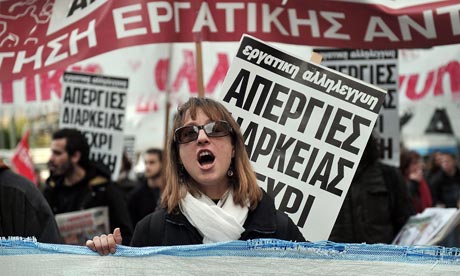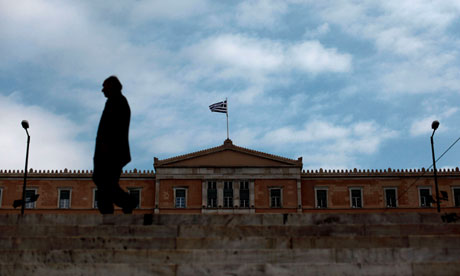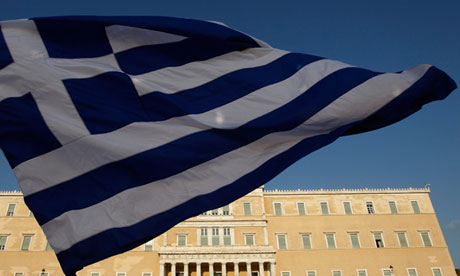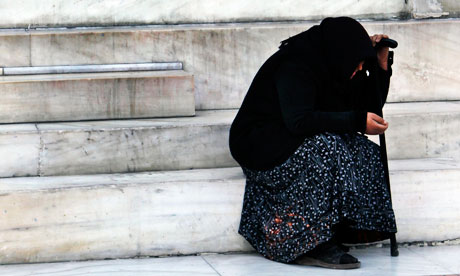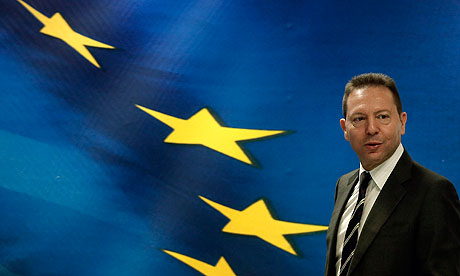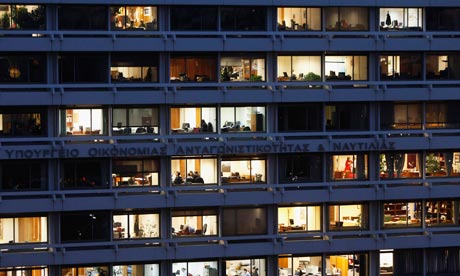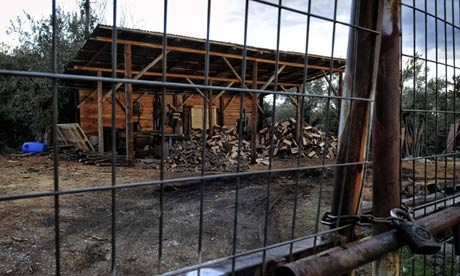Asylum seekers crossing from Turkey say they have been illegally deported by Greek police or blocked from entering
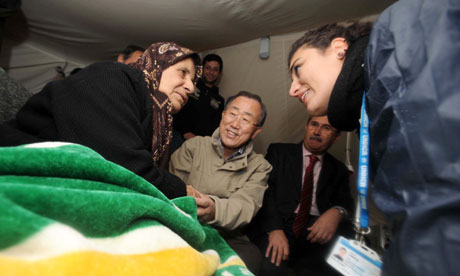
UN general secretary Ban Ki-Moon talks to refugees during a visit to the Islahiye Syrian refugee camp in Gaziantep, Turkey. Photograph: Veli Gurgah/Anadolu/EPA
On the edge of Europe, where the river Evros meanders towards the Aegean sea, a new tragedy involving two of the world's most troubled peoples is unfolding.
On one side of the river border are gathered clusters of Syrian refugees, desperate to escape the misery of war and put the Turkish camps behind them. But beyond the perilous currents lies Greece, a nation so economically bereft it has little time or resources for them.
The Evros has always been a barrier to those seeking asylum in the European Union, but now the surging tide of migrants fleeing Syria faces something new. Refugees, non-governmental organisation (NGO) workers and lawyers have told the Guardian that border forces have been pushing asylum seekers back into their boats and escorting them back back across to the Turkish side.
This summer two people smugglers left 25 Syrian refugees to cross the Evros alone at night. There were two rubber dinghies. The first disappeared across the river into the night. The second floated towards Greece, developed a leak, spun for 15 minutes and then capsized. Most of the men, women and children could not swim. Some survived using a fallen tree and some of the islands that peek out of the shallow waters.
The bedraggled Syrians who made it ashore walked for a couple of miles through dense woodland and asparagus fields.
It was nearly dawn but still dark when they arrived in a small Greek border village. Hungry, muddy-booted migrants are a common sight across northern Greece. Since the start of this year, 23,000 undocumented migrants and asylum seekers were arrested in Greece after crossing the border from Turkey. Syrians were the second-largest nationality arrested.
After their arrest, they are usually detained in administrative holding centres by the EU border police, Frontex, which has been deployed a few miles from the border since 2010. However, the group of Syrian refugees who made it across the Evros that night were not registered.
Instead, they were arrested by officers in "blue uniforms" and driven back to the river. "There were between 100 to 150 people by the river," said Farouk (not his real name), a 29-year-old from the Qamishli region in northern Syria. "They were of many nationalities, mainly Syrian. Some tried to make problems: they had paid a lot of money to get that far. When that happened, the police beat them. The police kicked and slapped them, including the women, they picked up children and threw them into the boat."
The officers put people in small plastic boats, which they tied to larger, motorised boats, and returned them to Turkish territory.
"We shouted loudly and said: 'We don't want to go back,'" Farouk continued. The Turkish border patrol helped them ashore. "We told the Turkish police and showed them signs of beating. They said they will make a complaint to the Greek police and we don't know what happened after that."
The accusation that Greek or Frontex officers returned refugees from Syria without screening them first is a serious one. Italy and Malta have been fiercely criticised for using "push-back" methods in the Mediterranean. This year the European court of human rights found that Italy had breached international human rights law by returning a boat of migrants back to Libya.
NGOs, lawyers, and locals working in Greece and Turkey say it is well known that Greek border police sometimes push back undocumented migrants and asylum seekers.
Levent Dinceli, a Turkish lawyer based in Edirne, close to the border with Greece, represents asylum seekers held in detention centres around Turkey. Many of his clients tell him about being pushed back by Greek border police. "There is a readmission agreement between Greece and Turkey, but it is not working well," he said.
"Very few people are sent the legal way. It is either the push-back method or they regroup these people in detention centres, then send them back to Turkey with boats. These boats are not safe. Putting people in these boats is also pushing them to their death."
A UN High Commissioner for Refugees source said the organisation could not comment on Farouk's story or illegal push-backs by Greek police in general. However, they acknowledged hearing similar accounts. "People say that there is a situation where people may enter the territory but are not registered as persons who are arrested in Greek territory. They are returned through use of force at night through the river. We think that these operations have been eliminated in the last two years."
Kelly Grivakou, a lawyer at the human rights NGO Aitima in Athens, said they often heard of Greek border police acting in breach of the law. "It is well known," she said. "It is illegal. When you enter a state and you need protection, and this state has ratified the Geneva conventions, the state has obligations to protect you. When you send a man from Iran or Afghanistan back to Turkey, when you know that maybe he is going to be deported back to his country, and might face danger or violence, you violate article 33 of the Geneva conventions."
Pasxalis Syritoudis, police chief of the northern Evros region, denied that his officers operated a push-back policy. "Migrants who don't succeed in crossing make these accusations to create problems for [us]. These accusations are being made because it is hard for a migrant to travel hundreds of kilometres to reach Greek borders and then not be able to make it across," he said.
However, Syritoudis admitted that his main goal was to "prevent people entering Greek soil". This meant sometimes his officers used boats to block migrants in dinghies from crossing the border. "We have 10 boats patrolling the river all the time. The boats are used to block people from crossing – to stop them getting to Greek territory." When asked how they demarcated the border in the river, he said: "The border is at the halfway point in the river."
He said: "Using the thermal-vision vans and night cameras, we try to see them [migrants] before they enter the river, when they are on the Turkish side to prevent them crossing. When we detect migrants on the other side, we go to the spot and by using police sirens and lights, we make our presence clear to them to prevent them from entering."
Greece is under huge pressure to seal off its borders, from the EU and at home, because of rising anti-immigrant sentiment among ordinary Greeks. Operation Shield, paid for by the European commission, is the government's latest attempt to stop illegal crossings from Turkey.
Since the start of Shield in August, 900 extra police officers have been sent to Orestiada, a small border town in northern Greece. The effects have been immediate: in July 6,000 migrants were arrested in the area. This dropped to 1,800 in August and September.
The government has also spent €3m (£2.4m) on a barbed-wire fence for its eight-mile land border with Turkey, a few miles from the river Evros. Even during construction, Demiertzis Nasos, whose company is building the fence, said he saw refugees crossing the border. "We see families, once even a four-month-old baby. They were wet from the river."
Many of those pushed back or stopped from entering Greece through its northern border have simply chosen to try their luck by boat across the Aegean sea. This route is fraught with danger. In September 58 people died after their boat sank off the west coat of Turkey. A number of the dead were Syrians who had travelled with Farouk just a few weeks before.
The effort spent on keeping migrants and refugees entering Europe brings little return because there is no structure in place in Turkey to stop them simply trying again. When a person is caught crossing the border to Europe they are put in one of Turkey's immigration removal centres. Between January and July this year, Turkish police arrested 14,559 irregular such migrants.
Increasingly, as border controls tighten between Greece and Turkey, migrants and asylum seekers choose to enter Europe through Bulgaria. Syritoudis said there had been an increase of about 200 people a week evading capture and crossing from Turkey into Bulgaria. Mahmud, 39, and his wife, Fadwa, 35, are one such Syrian family. As Damascus collapsed around them, they packed up their four children and left. The family has spent six months at an open camp in Pastrogor, an isolated border village in Bulgaria. During that time they have been given little information on what will happen to them.
Farouk is living at the same camp. "We don't know what to do. We cannot go back because there is a problem with our country. We cannot continue because we have no money. We are like slum dogs. Before we came here we heard that Europe is a country of humanity. But after all these experiences we see the opposite."
;)
![]()
![The [Greek] European Tragedy](https://blogger.googleusercontent.com/img/b/R29vZ2xl/AVvXsEiWKI5s90SFm1wWTk6bs4p7CgslaC2SnYPsrZhb-B-smOufNNCSxCvpBLI9hOB-LsXZjir_PNmEiMk2-E62F3xkg96IoC6QFAaZAnPRTVH340IN9WBRmWJqPkjWlgyRj3zpALp7h6hvA58/s920/GkBack_new.jpg)


